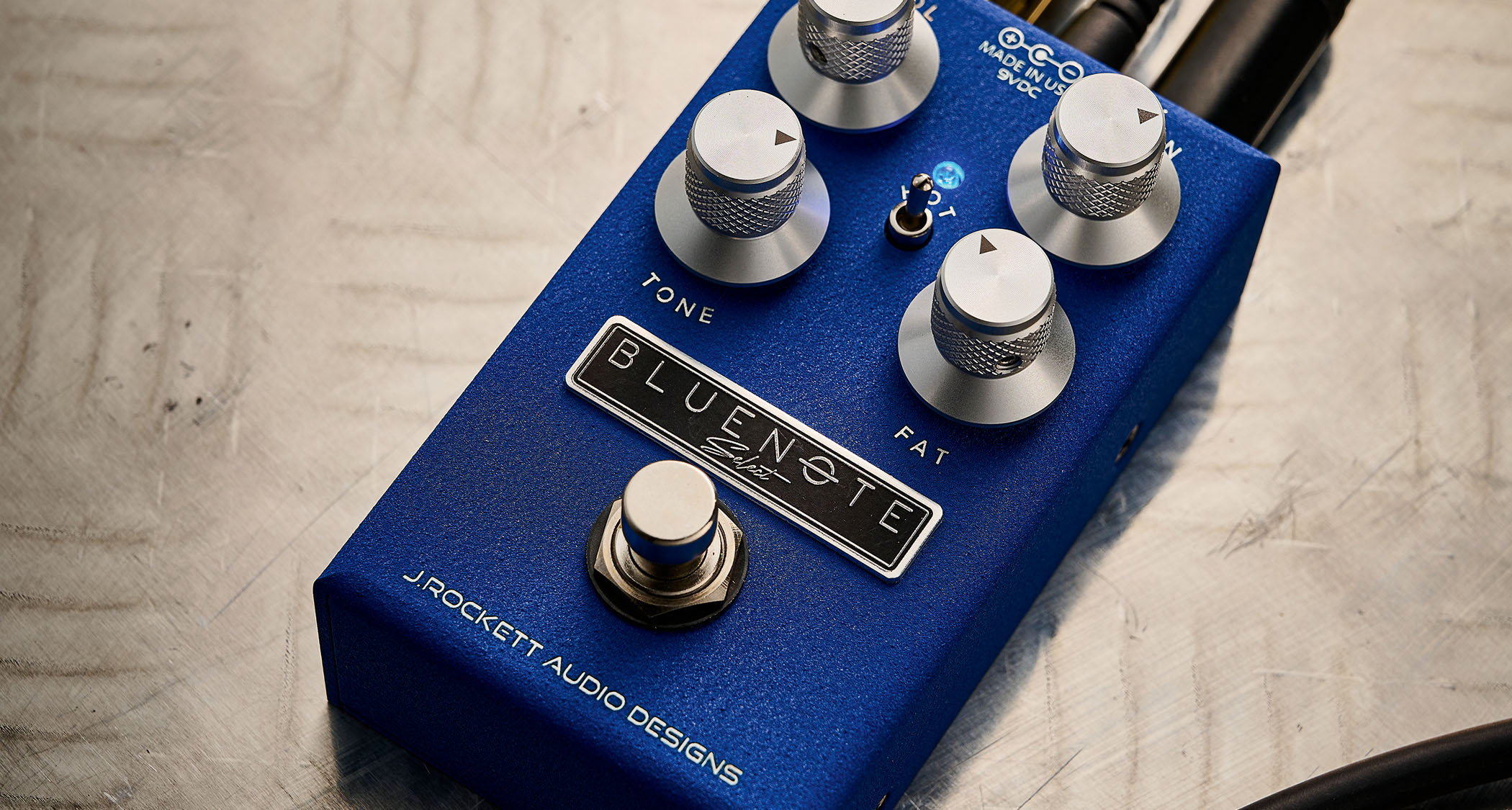Band of Horses' Ben Bridwell: "I see my guitar playing as a blessing, after years of seeing it as a hindrance – the way I play is unlike anyone else"
With new album Things Are Great on the way, the indie-rock mainstay discusses detuning guitars to fit his unique style, tattooing tunings on his arm, and how learning later in life led to his struggles with imposter syndrome

Ben Bridwell has been playing the guitar as long as Band Of Horses have been going, having first picked it up to pen songs in 2004. His group became a major force in indie rock in 2010 with the seemingly ubiquitous Infinite Arms, but even now the term ‘musician’ still sits uncomfortably with him.
“I’ve never been one to accept that, or any title,” he says. “I understand that I do write songs, but I don't want to call myself a songwriter. I know that I can sing a bit, but I don't call myself a singer…”
And that’s before we get onto ‘guitarist’, a term that represents both the source of his finest writing and greatest musical insecurity. It’s the fragility of that balance that makes his music so compelling, though – angry conviction and anxious uncertainty – one of the most beautiful voices in indie lilting over the “rag tag” punk playing. The melodic sweetness that sugarcoats the bitter pills of Bridwell’s internal monologue.
The group has not been without its struggles, though. Bridwell seems to regard – perhaps not unjustly – the years that followed Infinite Arms as if a creative coup was initiated. Shiny studios and big name producers started to feel like fancy cages with guards – an uneasy marriage. Lineups changed, as guitarist Tyler Ramsey and bassist Bill Reynolds were replaced.
Bridwell has faced personal issues, too. Many of these are alluded to with previously uncharacteristic clarity on new album, Things Are Great, which threads in stories of mental health issues, medicinal dependency, brushes with crime, broken relationships and betrayal.
However, for all the negative experiences that are documented – if not exorcised – on this album, it’s also a story of personal liberation. There is a sense that a veil has been lifted and that Bridwell has come away with a newly established and, frankly, unapologetic sense of himself and his creative values.
We spoke to Bridwell about coming to terms with his musical ability, the off-the-shelf pedal that was responsible for Band of Horses’ biggest hits and why he’s resorted to tattooing tunings on his arms…
Get The Pick Newsletter
All the latest guitar news, interviews, lessons, reviews, deals and more, direct to your inbox!
You came to the guitar relatively late, so you were viewing it from the outside for a long time. It still seems like you view yourself as being outside of it all. What shaped your idea of what a guitarist should be?
There's something special about not understanding what the hell this instrument can do. All the different ways it can be played, all the different styles that can be formed
“It always seemed like anyone that plays guitar seems to know everything about it. They all seemed to be virtuosos. Like, to be a guitarist is to know everything about it.
"To learn later felt like, 'Oh, I guess there really is a map of how songs work.' But I still think there's something special about the magic of not understanding what the hell this instrument can do. All the different ways it can be played, all the different styles that can be formed. I feel very much like that even my weird way of playing is an attribute and not a detriment.
“I had a record label before I was ever in a band. I was putting out other people's music, because I just didn't see myself in that role, you know? Even with my peers, I couldn't understand how they did these things: fingerpicking, or sliding up and down the neck with such ease. I just didn't see myself having much of a role in that ever, honestly!”
How would you characterize your approach to the guitar at this point?
“Well, as of today I kind of see it as a blessing, after years of downplaying my guitar playing and being self-effacing and seeing it as a hindrance – especially in the studio, just keeping things moving, so we're not wasting money. But on this last record, I found that to return to my strange way of playing is quite the attribute, honestly, because the way I play is unlike anyone else.”
You have a love of alternate tunings – the guitar tech’s nightmare scenario. What tuning’s have proven fruitful for you?
“Yeah, sure! [Shows arm] I've tattooed these on me!” [Bridwell’s tattoo reads ‘NO F# G# C# G# A# C#’ on the top line and ‘FUN G# C F# B C# D#’ on the bottom line – together it looks like ‘No Fun’].
With me, I put my fingers where they were comfortable first and then detuned the pegs to make a weird chord
“These are for No One's Gonna Love You and The Funeral, our two biggest songs – so I can see them while I'm tuning. That tattoo's paid for itself over and over! But yeah, they're very strange. I mean, it doesn't make a lot of sense to anyone that has to check the guitar, they don't know where to put their fingers. With me, I put my fingers where they were comfortable first and then detuned the pegs to make a weird chord or something."
I read a line about you putting your hands where it was comfortable, but I thought you meant open chords – I didn't realize you were literally detuning the guitar around your fingers until it sounded right!
“I didn't know what else to do! Honestly, it was out of desperation. And maybe it's laziness too, like, I didn't take the time to learn how to play. And shit, if I had taken the time, I'd still be a crap guitarist to this day, because I learned cowboy chords and all this stuff over and over. I'm never gonna be a great guitarist in the traditional sense, but I can find melody, and my job is to find a song somewhere, you know?”
It seems you've done some thinking about this – you've had this realization in relation to your own playing being an asset. What actual impact did that have in terms of the way the music came together on this record?
“I've got to tell you, it wasn't me. I was still kind of leaning back on [the approach of] 'Let the good guitar player do it.' It took a good friend of mine – Wolfgang Zimmerman – to force me into playing more on the records. He also helped produce this album with me. He forced me to do it and helped me to realize that it's an attribute."

It feels like you're coming from a similar place lyrically as well. You've described it as “if anything, maybe a bit T.M.I.” in an interview with Zane Lowe. How does that feel as a writer at this point? Is it hanging over you at the moment?
“Yes. It's still a bit raw. And, honestly, these themes on the record are still hanging over me. My life is not just about creating a record or being in this band. Everyone's lives are a bit complex, aren't they?
“I do know that I was intentionally trying to speak like I speak, even if there's cuss words, because you're always getting edited by producers saying, 'Oh, don't cuss here...' As if you're degrading the work by speaking that way, but I talk the way I talk.
“I think I had to accept myself in a way – accept the way I talk and the way I think – and put that realism to paper, and to mic. Yes, it is a bit ultra-realist for me to be exposing so much, but that was the point.”
What do you think it took to get you there? Why now?
Just be your damn self. Don't let all these people edit you into the dirt. Why not just be yourself and see how that works?
“[Sighs] Honestly, I think we fucking earned it. I'm not cocky about it at all – and I don't want to sound cocky. But after five or six albums, or whatever the hell we're at, like, it's like, 'Have you not earned the right to talk the way you talk?' If things are going a bit middling, as a career goes, then why not just try to be yourself? Just be your damn self. Don't let all these people edit you into the dirt. Why not just be yourself and see how that works?”
Taking it back to the technical side of things on this record, what were you leaning on most in terms of guitar gear?
“Okay, well, I have a guitar that seems to be the bell cow of the Band Of Horses catalog. It's written the majority of our singles. It's a Mosrite copy by Univox [a Hi-Flier Phase 3] and I've been playing this since Band of Horses started. So usually it starts with that. I was using that primarily and then, my favorite pedal, the one that's helped me write so many songs – and the best of the Band of Horses songs in my opinion – is the Boss DD-5 Delay.”
Why do you think the Boss DD-5 has worked so well for you in your writing, in particular?
“It started with our first album. There's a song I played bass guitar on – which I don't know how to play, either, so it's like de-tuned and completely wrong – the song called Our Swords. And [the DD-5] dictates the tempo. So it did that, it did the Great Salt Lake, The Funeral, No One's Gonna Love You.
"At first, I wasn't playing with anybody and I didn't know how to play guitar, so the different settings I'd find would set the tempo, to allow me to play without a drummer and give me the extra time to get my hands back into position at the one chord.
They say country music is three chords and the truth, and my joke is, ‘Well, Band Of Horses is two chords and the truth!’
"They say country music is three chords and the truth, and my joke is ‘Well, Band Of Horses is two chords and the truth!’ So the DD-5 allowed me time to reset my positioning and then dictates the tempo, which is basically writing the song for me. But I can tell you a million songs it's on. It's on this record, it's on every album – and any single that we've done, I'm pretty sure that the DD-5 has been there.”
What about on the amplifier side?
“Well, I have hoarded a bit, but the guitar amp I traditionally go with is a Marshall Bluesbreaker. It seems to have the body and break-up: it gives me a chance to push a bit. And I do use other pedals to for gain-stage purposes. Notably, there's a brand here in South Carolina called Caroline Guitar Company that I really love – I fuck with them, very much.”

In terms of gain, Band Of Horses songs ride a really nice line between that clean/crunch/distortion territory. What are you looking for there?
“It's an interesting line to toe there because you don't ever want it to get into like, well, overly thrash metal sounds. There's a bit of a line on every pedal and everyone's always toying with their shit, I swear to god. 'I got this new pedal!' [And you think] ‘God, just fucking use your volume knob!’ But within any band, there's some line where you're like, 'Okay, we've gone too far.'
I want our music to sound like the guitar and the amp is doing the work. You don't ever want it to sound artificial
“With us, I've never tried to put it into words before, but as long as it still sounds like the amp’s doing the work, even though the pedal is helping you push, it’s good. I want it to sound like the guitar and the amp is doing the work. You don't ever want it to sound artificial… I want to sound like the rock 'n' roll that I hear in my head.”
You’ve discussed previously how you were sneaking out of sessions on the previous album [2016’s Why Are You OK] to make demos with Wolfgang Zimmerman on the side. Why did it feel necessary, in the band that you were steering to all intents and purposes, to go off and make your own demos during that period?
“I think it goes back again to feeling like, 'Am I not allowed to make the songs the way I hear them?' Does my opinion not matter enough to warrant at least a stab at it?' That was really kind of nagging at me.
“I mean, who gets the opportunity to make this many records, or to have this long of a life inside of such a tough industry? Like, have I not warranted the ability to go and call my own shots for once? And that's why I believe I was stepping out. I can only go so far with my demoing prowess. Like, I need my friend. He records in this storage shed and it seemed like we were both ragtag enough to make the shambles of my demos more appealing. So, I guess, I just needed to prove to myself that I could do it.”
Tell me about your playing relationship now with guitarist Ian MacDougall [who replaced Tyler Ramsey]. Why does that work?
“Ian comes from a punk background, as does Matt Gentling, the bass player. Matt comes from my favorite band growing up as a kid, called the Archers of Loaf. I felt it just gelled more with that style that I was working on, which is like my ragtag, demoing shit. Ian was our merch guy, so we have upward mobility in Band of Horses!
"The fact that we could get some of that punk spirit that I also grew up with, I really wanted to inject that into the new songs. Ian's a guitar teacher, too, so he also has a great knowledge of what those Beatles chords are and shit like that. They're people who can actually decode what my weirdness is and can figure out a way to clean it up a bit, while still keeping it rowdy.”
Sometimes I think music theory is like that phrase, 'A little knowledge is a dangerous thing.' That it seems best to see the whole map, or just not use a map…
I almost don't want to learn too much. I think there's something about my shit playing that lends itself to uniqueness
“You've nailed it there. I almost don't want to learn too much. Because I do think there's something about my shit playing that lends itself to uniqueness. I do need help around me – folks that that can suss it out a bit. But I also don't don't want to learn traditional things that would put me in traditional patterns of writing. I'm a bit afraid of that, for sure.”

Back in 2010, at the height of Infinite Arms, you described your process as “fake it till you make it”. Do you still feel like that's the case?
“I do feel like I've matured, at least enough to be like, 'Oh, maybe there is some merit to the way that I play.' And to stand up to producers and say, 'Dammit, that's the last fucking play. That's the way this song fucking sounds in my mind!'
“I do believe I'll always retain that underdog [feeling], as far as guitar playing or musicianship goes. I'll always retain that. I'll never kick it. But at the same time, I do feel like I'm a bit more secure in myself as a person to know that I bring something special. And something that's worth fighting for.”
- Things Are Great is available to preorder now via BMG ahead of its release on March 4.

Matt is Deputy Editor for GuitarWorld.com. Before that he spent 10 years as a freelance music journalist, interviewing artists for the likes of Total Guitar, Guitarist, Guitar World, MusicRadar, NME.com, DJ Mag and Electronic Sound. In 2020, he launched CreativeMoney.co.uk, which aims to share the ideas that make creative lifestyles more sustainable. He plays guitar, but should not be allowed near your delay pedals.
“It combines unique aesthetics with modern playability and impressive tone, creating a Firebird unlike any I’ve had the pleasure of playing before”: Gibson Firebird Platypus review
“I met Joe when he was 12. He picked up a vintage guitar in one store and they told him to leave. But someone said, ‘This guy called Norm will let you play his stuff’”: The unlikely rise of Norman’s Rare Guitars and the birth of the vintage guitar market










